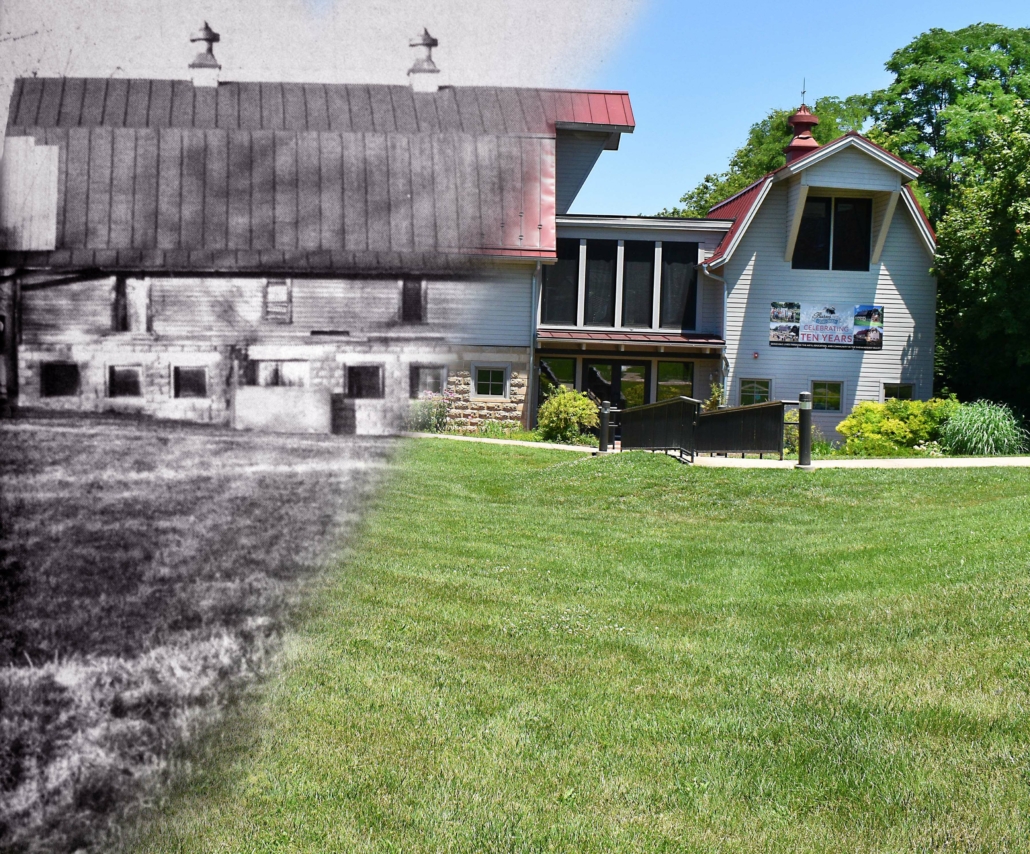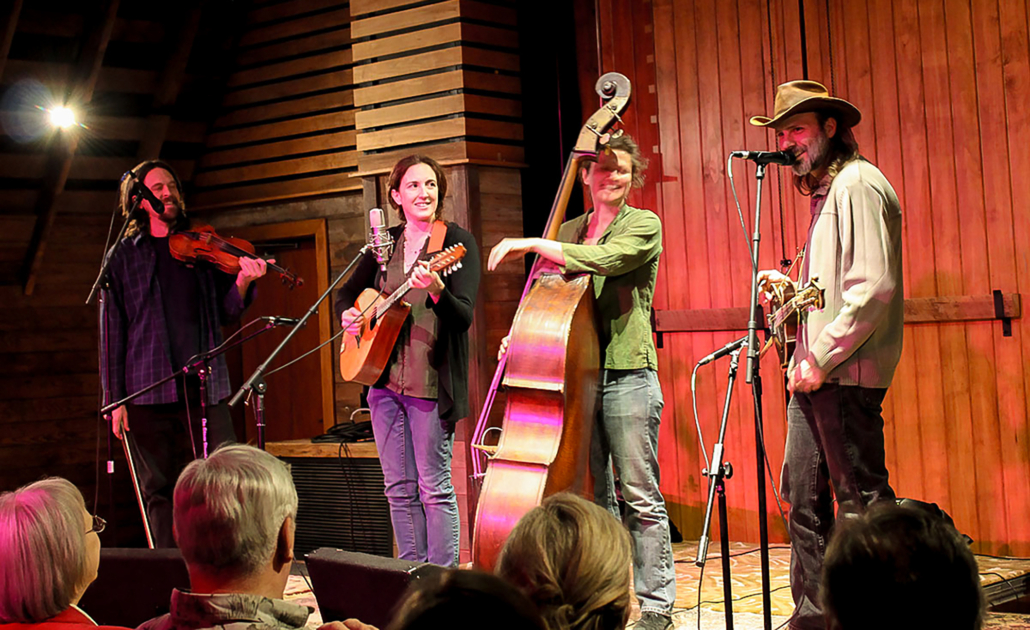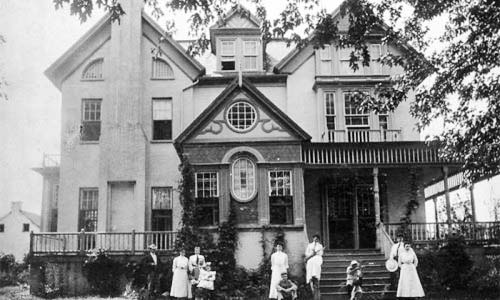The Barns of Rose Hill: Celebrating a Milestone Anniversary and Decades of Support

By Cathy Kuehner
Hundreds of people have played significant roles over the decades, working to build a contemporary cultural arts and community center out of two old dairy barns in downtown Berryville. They gave creativity, time, money and — quite literally — blood, sweat, and tears to build the Barns of Rose Hill.
“Given the small size of our community, it’s kind of amazing that the Barns happened at all,” said Michael Hobert, a longtime supporter of the Barns and a member of its Board for the past six years. Hobert, who grew up in Berryville, remembers the Smithy property known as Rose Hill, its development into Rose Hill Park, and the old barns there.“When I was growing up, we went to the community building for events,” he said, referring to the American Legion building that is now used by Dollar General on Church Street. After the town was given the Smithy property in the 1960s, Hobert said there were “a lot of false starts as people tried to do something with it.”He always believed the circa-1910 barns last occupied by livestock in the 1950s could be “a center where people come together to enjoy music and art.”
Hobert said the Barns of Rose Hill became a reality 10 years ago thanks to visionaries like Diana Kincannon.In 2004, Kincannon was asked to help with the barns community center project. The first thing she did was seek counsel to establish it as a 501(c)(3) nonprofit organization to provide for a Board of Directors, a clear mission and vision, and the ability to apply for much-needed grants.With Barns of Rose Hill, Inc., established, the board focused on a $2 million fundraising campaign.
“We developed a clear vision for the barns,” said Kincannon, who served as the board’s first president. “We articulated the intangible benefits to the community: the power of the arts and creativity to bring people together, to enrich our lives, and to enrich the whole community.”Those associated with the project were known as “Barns Raisers,” and they kept on that message for six years. “We pursued every avenue we could,” Kincannon said.Gifts came in all sizes — $5 to $100,000 — as did grant money. The Town of Berryville and Clarke County governments contributed, too, so the Barns of Rose Hill could also serve as a tourism center.“
When the Barns finally opened in September 2011, it was exactly what we envisioned,” Kincannon said. “There was classical music, bluegrass, jazz, theater, and so much visual art. Ten years later, the Barns continues to fulfill our vision, and it has exceeded my expectations.”
Like Hobert, Susi Bailey was born and raised in Clarke County, and over the years she has owned a business along Berryville’s Main Street and served in many civic organizations, including Downtown Berryville Inc. “This is my community, and the Barns project was a community effort, so of course I helped.”
In a predominantly agricultural area, one hurdle was explaining the need for a cultural center. “Do we need art and music?” The question was often asked, Bailey said, but the movement to preserve the historic barns and create a place for art and music grew and grew.“
When we broke ground for the Barns in 2010, I felt like I had been pregnant for 10 years and had finally given birth,” Bailey said, laughing.
After opening, the board served as management until it could find money for a small staff, and it took the Barns a while to find its audience and attract the recognized artists and musicians it does today.
“We’ve been pretty stable since 2014,” Bailey said, adding, “We have a good 13-member board, good staff, and every year more people come for
the shows.”
In 2019 almost 10,000 people passed through the Barns’ doors, Kincannon said, noting visitors were coming from Northern Virginia, the Shenandoah Valley, and West Virginia’s Eastern Panhandle. “Momentum was building for a better year in 2020.”
Then came the coronavirus. Businesses everywhere — especially performance venues — were hit hard financially by the global pandemic.
Sarah Ames, who began as the Barns’ office manager in 2017, was named executive director in January 2020, just as the world was beginning to hear about COVID-19. “Our 2020 schedule was fully booked with about 40 concerts, 30 community events, and weekly programs like music jams and art classes. Then, we had to shut down for months.”
Its small staff — Ames, program director Morgan Morrison, director of operations Nathan Borger, and part-time office manager Tiwana Brooks — had to be more creative than usual and adapt to broadcasting concerts and classes on YouTube and Facebook.
“In a good year, 30 percent of our income is ticket sales,” Ames said. Fortunately, enough folks paid for online offerings or made donations to help the Barns get through 2020. Ten years on, the community sees the value of the Barns.
Morrison joined the Barns small staff in 2012. She had performed there before with Furnace Mountain, and she continues to perform there with the band and at the bi-weekly Thursday night old-time music jams.

“As a musician, I enjoy bringing people together for a common experience,” she said.
Morrison says programming continues to evolve as staff determines what the community wants and as performers learn of the Barns’ intimate performance space with outstanding acoustics. “We want to introduce audiences to new experiences, and that needs to be balanced with the familiar,” she said.
A thriving cultural arts center in an agricultural area is a significant accomplishment, Ames added. “It’s a great place for people to come together — and we especially need that in this post-pandemic time.”
Bailey believes more and more people recognize the Barns as a community resource.“The Barns attract people from all over Clarke County and even farther away,” Hobert said. “I hope the Barns continue to grow and engage more people.”
“I see the Barns of Rose Hill as a promise fulfilled to the Smithy family,” Ames said. “It was important to the family that their property benefit everyone, and the Barns do that.”Said Bailey, “I still get chills when I’m standing in the Barns at a sold-out show and think about how far we’ve come.”
A Brief History

It may be difficult for some to imagine a farm with a grand home in the center of Berryville. Those who lived in Clarke County in the 1960s and ’70s may remember the property being gifted to the town, its gradual development into a park, and the spring day in 1978 when an arsonist destroyed the mansion before plans to create a community center could be realized.
Fortunately, the circa 1910 barns on the property were unscathed by the fire. Today, they are the much loved Barns of Rose Hill — a community, tourism, and arts center that has hosted countless exhibits, concerts, movies, and educational programs since opening in September 2011.
But the transformation from livestock barns last used in the 1950s to a contemporary cultural center took decades, and would not have happened at all without a community of dedicated and passionate volunteers.
Originally a 100-acre estate, Rose Hill was built in the mid-19th century by S.S. Neill, a surgeon for the Confederate Army. Following the war, the property was sold to Marshall McCormick, a lawyer who later served as Berryville mayor, Clarke County Commonwealth’s Attorney, and Virginia senator. McCormick owned other large farms in the county, too, including adjoining Clermont as well as Annfield and Norwood.
McCormick’s daughter Rosalie married Horace Gilbert Smithy in 1911, and soon after, Smithy purchased Rose Hill from his father-in-law.
Rosalie died in 1963 and, in 1964, Smithy donated their Rose Hill estate to the town. By then it was only a few acres, the mansion, the barns, and a small house. To honor his wife’s interests, Horace stipulated that the Rose Hill property be used for “the educational, recreational, and cultural benefit of the community.” For a while the mansion was used sporadically for community events.
By 1968, it was the Clarke County School Board leading discussions about converting Smithy mansion into an educational and cultural center, including a library and space for teenagers to hang out. The Board obtained grants, plans were made, but time and again the project stalled. The fire in 1978 put an apparent end to the proposed “Clarke County Community Center.”
Meanwhile, the Town of Berryville developed Rose Hill Park, adding its iconic gazebo in 1985. In 1989, the Berryville-Clarke County Chamber of Commerce was given permission to renovate the barns for its offices, a tourism center, and art gallery.
Turns out, renovating two barns that sat unused for almost four decades was not easy or inexpensive.
By 2001, Rose Hill Park was well established, and the Town of Berryville and Clarke County together purchased 3.56 acres of vacant land next to it to enlarge the park and create additional access to the barns. The land also provided space for the Berryville-Clarke County Government Center that opened in December 2008.
The same year, Downtown Berryville Inc. (a Virginia Main Street program) began organizing fundraising events to support the restoration of the barns.
It took years.
A nonprofit organization — Barns of Rose Hill, Inc. — was officially formed in September 2004, and it launched a capital campaign to continue the
fundraising efforts.
Community members and donors were affectionately called “Barns Raisers,” and the Berryville-based architectural firm of Carter+Burton was hired to design the building.
Carter+Burton sensitively preserved a lot of the early-20th century barns’ original character and structure — including much of its wood, red standing-seam metal roof, and venting cupolas — while creating a beautiful, functional 21st century facility.
Construction began in 2010 after more than $2 million in public and private funds had been raised, and the project was completed in late summer 2011.“Saving the barns mattered to a lot of people,” said Diana Kincannon, who helped form the nonprofit organization in 2004 and served as the first president of its board of directors. “We knew we had these wonderful old barns, and this was our last chance to save them.”
The Barns of Rose Hill exist today because enough people cared to give as little as $5 or as much as $100,000 so the community may enjoy the fine and performing arts well into the next century.
Be Part of the 10 Year Celebration
To mark its 10th anniversary, the Barns of Rose Hill is hosting a free event for the community on July 31, an historical exhibition throughout October, and a gala event on Oct. 16. Follow “Barns of Rose Hill” on Facebook or go to barnsofrosehill.org for details, updates, and additional events.
10-Year Celebration on Saturday, July 31
The Barns of Rose Hill invites everyone to meet in Berryville’s Rose Hill Park at 5 p.m. Saturday, July 31, for a free outdoor concert, kid-friendly activities, and a petting zoo. Hog-it-Up BBQ and Generations Gourmet food trucks will be on site. At 7 p.m., Grammy nominee Cheick Hamala Diabaté and his band present a free concert of West African music that will have everyone on their feet and dancing.
Interactive Exhibit in October
The Barns staff has been busy this year gathering archival photos, newspaper articles, and memorabilia that tell the story of how two old dairy barns were transformed into a contemporary cultural arts and community center. People new to the area, people who love history, and everyone who appreciates the Barns of Rose Hill will be fascinated by this month-long exhibit.
Fundraising Gala on Saturday, Oct. 16
The global coronavirus pandemic disrupted just about everything for everyone. Non-profit organizations like the Barns of Rose Hill did all they could to keep the lights on and continue presenting art and music in some form. The Barns held an online fundraising event in 2020, but staff is planning an in-person gala later this fall.
Buy an Anniversary Brick!
The traditional 10-year anniversary gift is tin or aluminum, but perhaps you’ll consider an engraved brick for the patio leading into the Barns. This year, the Barns is offering a special 8-by-8-inch commemorative brick for $250. These bricks can be inscribed with three lines of text; each line up to 18 characters including spaces and punctuation. A standard-sized 8-by-4-inch brick is available for $100. It can accommodate up to three lines of text; each with 21 characters including spaces and punctuation. Contact the Barns at (540) 955-2004 or info@borh.org., or go
to barnsofrosehill.org.
The Barns of Rose Hill is located at 95 Chalmers Ct. in Berryville. Hours are noon to 3pm Tuesday through Saturday for exhibits, tours, and the tourism center and at other times for performances, events, and classes.
Contact the Barns at (540) 955-2004 or info@borh.org.
Follow “Barns of Rose Hill” on Facebook. Find more information at barnsofrosehill.org.









